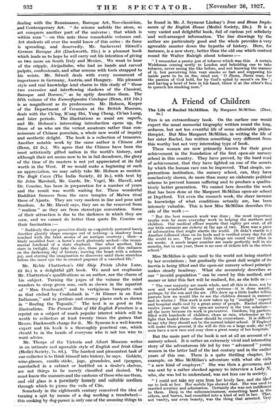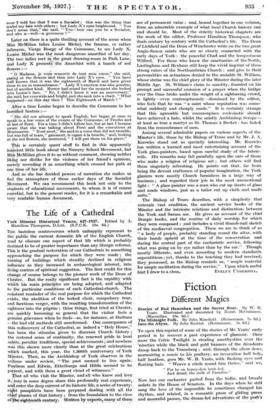A Friend of Children
Tins is an extraordinary book. On the surface one would expect the usual memorial biography written round the long, arduous, but not too eventful life of some admirable philan- thropist. But Miss Margaret McMillan, in writing the life of her sister Rachel, has written something very different from this worthy but not very interesting type of book.
These women are now primarily known for their great achievement in the foundation of the first open-air nursery schocil in this country. They have proved, by the hard road of achievement, that they have lighted on one of the secrets by which the human race can be improved. That simple, un- pretentious institution, the nursery school, can, they have conclusively shown, do more than many an elaborate political scheme to.prevent human suffering and to produce a qualita- tively better generation. We cannot here describe the work that has been done at the Margaret McMillan open-air school at Deptford. Yet even the research work, the sheer increase in knowledge of what conditions actually are, has been intensely valuable. This is hoW Miss McMillan describes this side of the work :— " But the best research work was done ; the most important truths won by mere everyday work in helping the mothers and children. Our medical officer reports that eighty per cent. of all our little entrants are rickety at the age of, two. Here was a piece of information that might startle the world. (It didn't startle it.) Another-followed close on its heels and is verified every day for all the world to see. The poor little things are cured very often in six weeks. A much larger number are made perfectly well in six months, but in one year, there is no case of rickets left in the whole school."
scrutiny and admiration. Certainly she was not indifferent
others, and barren, had crumbled into a kind of soil in her. That;
Miss McMillan is quite used to the world not being startled by her revelations ; but gradually the great dull weight of its inertia is being lifted and the open-air nursery school principle makes steady headway. What she accurately describes as our " invalid population " can be cured by this method, and sooner or later this fact will be realized, for, as she tells us :—
" The vast majority are made whole, and all this is done, not by new and wonderful methods and systems—it is done mainly, perhaps, by the sun and the. air. (We drew up a little leaflet telling parents how we would like to see the children dressed in summer and in winter.) This work is now taken up by "sunlight " experts and hospital staffs and by a great army of people. Rachel showed twelve years ago that the open-air nursery is the true solarium— all the more because its work is preventive. Gardens, big gardens, filled with hundreds of children, clean as rain, wholesome as the light that healed them—these should be everywhere. It is difficult to say why they should not be the normal infant school. If England will make them general, if she will do this on a large scale, she will sootrt- told her that 1- was a Socialist; this was the thing that sealodmy fate with others :. but Lady-X's eyes- brightened. You don't mean that," she said. " You—how can you be a Socialist, and also •a—well--a governess ? " • • Later on there is a quite thrilling account of the scene when Mils McMillan takes Louise Michel, the famous, or rather infamous, Vierge Rouge of the Commune, to see Lady X. LotiiSe Michel was the most dangerous anarchist of her day. The two ladies met in the great drawing-room in Park Lane, and Lady X presentsIhe Anarchist with it bunch of red flowers :— " .0- Madame, je voue remercie de tout mon' Coeur," she said, gaming' at the flowers and then into Lady X's eyes. " You have well known that it was the eighteenth of March and have given these to me in remembrance." Lady X's emotion was also genuine, but of, another kind. Horror had seized her the moment she looked into Louise's face. " No, I didn't know it was an anniversary," she'said, her eyes wide and bright, and she sank into a chair. " What happened—on this day then ? This Eighteenth of March ? "
After a time 'Louise began to describe the Commune to her horrified hostess :—
"She did not attempt to speak English, but began at once to speak:in a low voice of the events of the Commune, of Trochu and at hist of Ferri. For a time I didn't follow her, but at last I became aware that she was talking about Ferri and the executions at Montmartre. " 71 est mort," she said in a voice that did not tremble; but was full of tears, " gaiement, le cigars a la bouche," and, looking at the red flowers, she muttered, " I will put them on his grave." .
This is certainly queer 'stuff to find in this apparently
.
innocent little boak about the Nursery School Movement, but Miss McMillan gives it to us without comment, showing neither liking nor dislike for the violence of her friend's opinions, meiefy recording it as something which crossed her path at one time Of her We; - - And as she has decided powers of narration she makes us feel the atmosphere of those earlier days of the Socialist .MoVement. We can recommend this book not only to the students of educational movements, to whom it is of course essential, but to the general reader, for it is a remarkable and very readable human document.























































 Previous page
Previous page